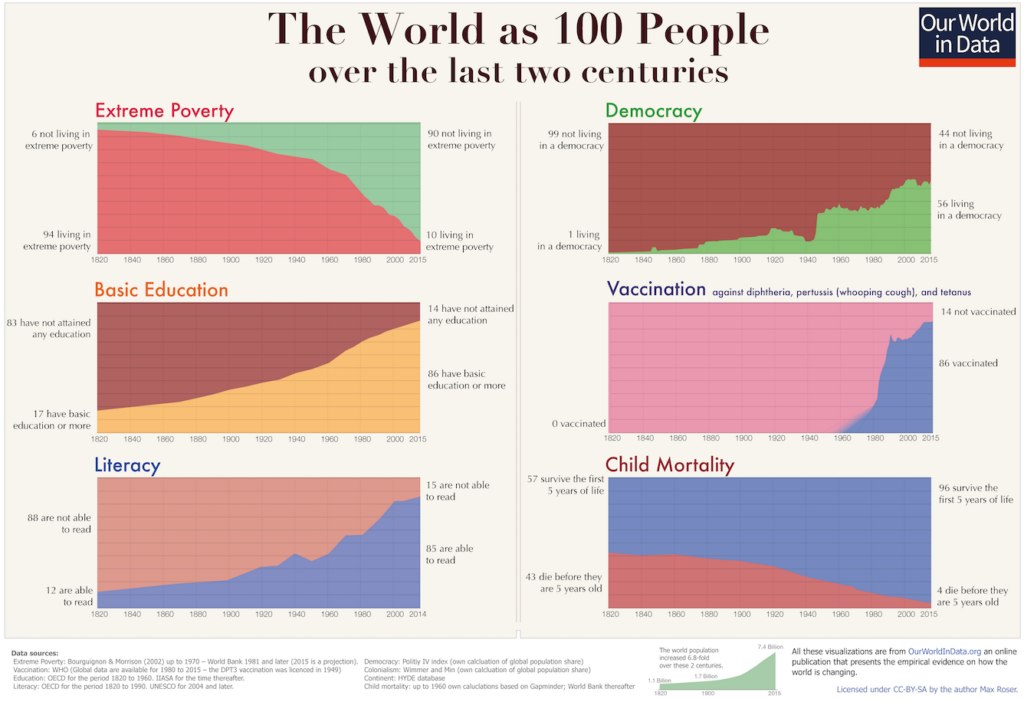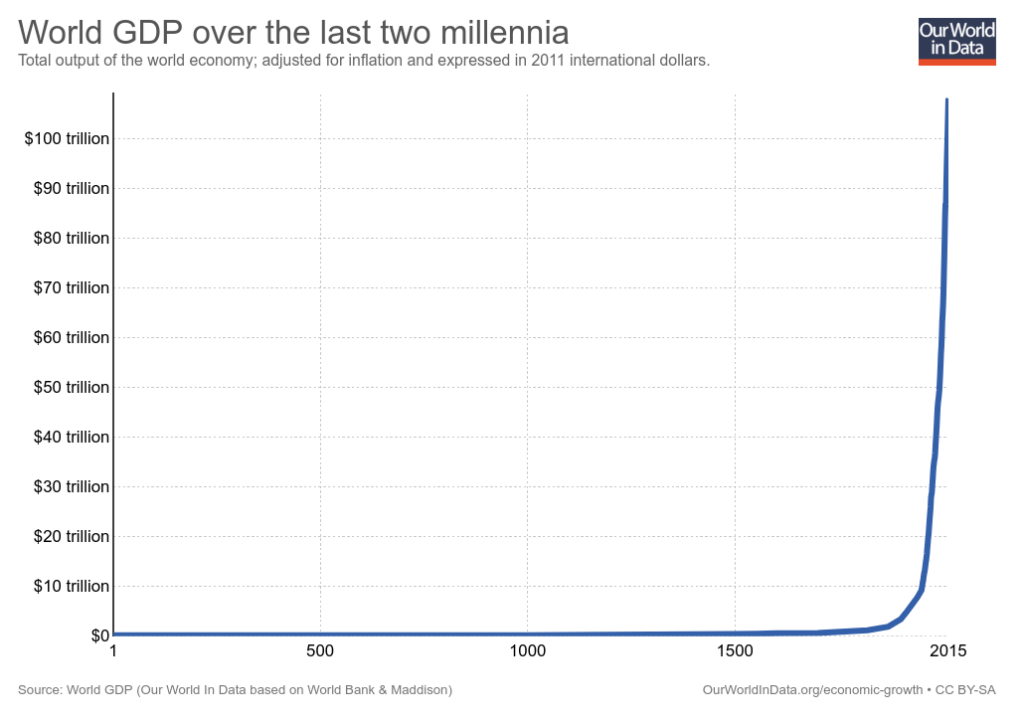Originally written by Jason Crawford for his The Roots of Progress website
Tyler Cowen and Patrick Collison recently published an article in The Atlantic calling for a new discipline of “progress studies”. It met with an enthusiastic response from many people and has galvanized a small movement, which now has a Slack group and last Wednesday held its first meetup (hosted at Founders Fund). I was the speaker and gave a talk on the history of steel (recording coming soon). I concluded with some thoughts on progress studies, why it’s crucially important, what I’m doing about it—and how you can help.
Why progress needs to be studied
Progress is real and important. As I wrote in a previous post:
50,000 years ago, our ancestors lived at the mercy of nature. They had stone tools, and the use of fire—and not much else. They had no agriculture: they survived by hunting and foraging. They had no medicine. They had small boats to travel short distances on water, but on land they had to walk, and anything they took had to be carried. They had language, but no writing. Of course, they had no science. And they had only the tribe to protect them: no police, no courts, no law. In short, their lives were characterized by abject poverty, superstition born of ignorance, and constant tribal warfare.
We have come a very long way. We live in buildings, not caves. We are surrounded by mass-manufactured products made of steel, glass and plastic. We extract vast sums of energy buried in the ground and we make it do our bidding. We have all the food we could want—so abundant and delicious that we have to restrain ourselves from eating too much. We have antibiotics and laser surgery. We zip around the world at hundreds (and maybe soon thousands) of miles an hour. We can communicate with anyone, anywhere, anytime, instantly. And all of this is made possible by a vast and rapidly expanding scientific knowledge of the world. Further, we live in relative peace and freedom, made possible by governments that maintain law & order—and the institutions of democracy and republicanism that keep those governments in check. In short, compared to our prehistoric ancestors, we are smart, rich and free.”
These charts from “Our World in Data” show the story quantitatively:

To understand these facts, and to care about human life and happiness, is to see progress as a moral imperative.
But progress is not automatic or inevitable. For most of human history, very little of it happened. Almost all our progress has been made in the last 500 years—even though we’ve had writing for 5,000 years and language for 50,000. Seen this way, we are fantastically wealthy relative to where we were even a hundred years ago—and by implication, we are desperately poor compared to where we can be a hundred years from now, if we keep this going.

Indeed, even the idea of progress isn’t natural. It’s relatively new. To make progress we need to believe that it is possible and desirable. In contrast, most of history has consisted of static societies where no one believed that anything would, could, or should change.
Further, we know from history that progress is not even monotonic: it can be slowed, stopped, reversed or lost. Science, art, and government all suffered and declined during the Dark Ages after the fall of the Roman Empire. China famously destroyed its own naval capacity in the 1400s. And closer to home, some including Robert Gordon and Peter Thiel argue that innovation in the US has stagnated in the last 50 years.
So if progress is a moral imperative, it is also a moral imperative to understand its causes, so that we can protect them and reinforce them. We need to ask three questions:
- How did we get here? What were the steps of this amazing journey?
- Why did it take so long? Why did so many people have to suffer and die for so long before we finally found the keys to progress?
- How do we keep it going? And even speed it up? Conversely, what could threaten to slow, stop, or reverse it?
Progress at risk
But I will go further. I submit that progress today is threatened.
First, most people today don’t appreciate progress. And how could they? They don’t learn about it in school: it falls between the cracks of history and science classes. They don’t learn about it from the news media, who are subject to strong negativity bias (“if it bleeds, it leads”). They don’t get it from popular culture, which since the 1950s has increasingly turned away from optimistic visions of the future and toward dystopian ones.
And even for those who have a glimmer of this amazing story and the curiosity to learn about it, it’s hard to study on your own. Serious books on the subject are dry, dense, academic, and often narrowly focused. Popularizations are often mere entertainment or “mind candy”, often focusing on human drama and glossing over the real story: the actual problems we faced and solutions we created. Neither of them leave you with a big picture that you can retain or a framework you can apply to new issues.
The result, according to polls, is that most people don’t even know or believe that progress has happened. They would react to the charts above with surprise or disbelief.
But it gets worse: progress is actually under attack, from several quarters. As Steven Pinker points out, “the Enlightenment was swiftly followed by a counter-Enlightenment, and the West has been divided ever since”. Rousseau advocated a return to nature and praised the “noble savage”. Today, anti-tech narratives are on the rise, with claims that technology invades our privacy, steals our attention, and isolates us from one another. Romantic “greenists” spread fear about technologies that are actually beneficial, such as GMOs. Some attacks come from academia, such as Jared Diamond’s claim that agriculture was “the worst mistake in the history of the human race”. We see conspiracy theories, such as the anti-vaccination movement, which has led to new outbreaks of measles and other preventable diseases. And there is a growing distrust of elites and institutions, including the elites and institutions that drive progress: founders and VCs, scientists and universities, even courts and the rule of law.
So I see threats to progress. Populist political movements could enact policies that would slow, stop, or destroy it. After all, when you don’t understand how far we’ve come, it’s easy to romanticize the past as a lost golden age, a Garden of Eden from which we have fallen. When you don’t see the modern world as a set of solutions to problems, it’s easy to propose un-solving problems we have already solved.
Even more worrisome is the risk that the next generation will not be motivated to pursue progress. Progress only marches on when we decide to drive it. To keep it going, the students of today must become the scientists, inventors, and business leaders of tomorrow. If no one tells them the story of progress, and all they hear are the attacks, who will be inspired to carry the banner forward?
So progress needs to be defended. We need to tell its story, counter the attacks with truth, and promote progress as a noble quest.
This project and its future
There are many ways to study, promote and defend progress. What I see as distinctive about this blog is that it’s written for a popular audience (the educated, intelligent, curious layman); it attempts to give the big picture, but with a bottoms-up empirical/historical approach; and it strongly focuses on the problem-solution orientation.
Today, I’m writing this blog, and I’m starting to give some talks and do some podcast interviews. But I’m at a crossroads in my career: I’ve just left a job and I’m exploring opportunities for my next step. My career has been in the tech industry, but I’m considering a sabbatical to work on this project, if I can find a way to fund it. In addition to simply writing a lot more blog posts, future work could include a podcast or YouTube channel, or even interactive diagrams or games. Eventually, I’d like to write a book (or several).
If you would like to help fund this, or know of anyone who would, please get in touch: jason@rootsofprogress.org.
Social media link image credit: Our World in Data

